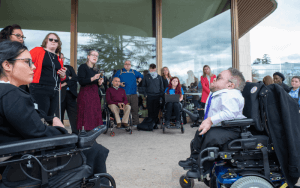
The Equality and Human Rights Commission (EHRC) appears instead to back the UK government’s controversial position on special schools, and has put itself in opposition to a key demand of the disabled people’s movement.
The commission’s comments emerged after Conservative education secretary Michael Gove was branded a hypocrite for attacking the segregation of female and male students at religious events in universities, while moving to increase segregation of disabled children and young people in schools.
EHRC echoed Gove’s comments on gender segregation, stating that “in an academic meeting or in a lecture open to the public it is not, in the commission’s view, permissible to segregate by gender”.
But when asked by Disability News Service whether it believed that segregation of disabled pupils by placing them in special schools was also wrong, the commission made it clear that it was only in favour of including some disabled children in mainstream education.
An EHRC spokesman said: “The Equality and Human Rights Commission supports the inclusion of disabled children in mainstream education settings where possible but recognises that there are cases where this is neither possible nor appropriate.
“This is particularly the case for some children with very severe learning difficulties.”
The spokesman added: “Complex disabilities mean that some parents may choose to send their child to a special school, but parents need to be able to work with educationalists to make informed choices, and this includes knowing about the range of options available for their child’s education.”
Inclusive education campaigners have warned that the government is trying to put into effect the pledge in its “programme for government” to “remove the bias towards inclusion” in disabled children’s education.
Tara Flood, director of the Alliance for Inclusive Education (ALLFIE), said EHRC’s position on inclusive education was similar to the government’s.
She said: “I am confused and deeply disappointed but not at all surprised. It really just reflects where the EHRC is at the moment.”
The UN convention – in contrast to the EHRC position – states that countries that sign up “shall ensure an inclusive education system at all levels and life long learning”, and should ensure that disabled children “are not excluded from free and compulsory primary education, or from secondary education, on the basis of disability”.
It also states that countries that have signed up to the convention should ensure that “persons with disabilities can access an inclusive, quality and free primary education and secondary education on an equal basis with others in the communities in which they live”.
Flood said EHRC’s position was a particular concern because it was the national organisation tasked with monitoring the UK’s implementation of the UN convention.
She said: “It is a huge worry because if that is their position they will not be lobbying in the way they should be for full human rights in regard to education.”
23 January 2014

 Seven years on and no progress on disability rights by UK government, says UN
Seven years on and no progress on disability rights by UK government, says UN UN’s ‘damning verdict’ is ‘vindication’ of fightback against government’s rights violations
UN’s ‘damning verdict’ is ‘vindication’ of fightback against government’s rights violations Black disabled pupils face systemic barriers and injustice at school, says new report
Black disabled pupils face systemic barriers and injustice at school, says new report